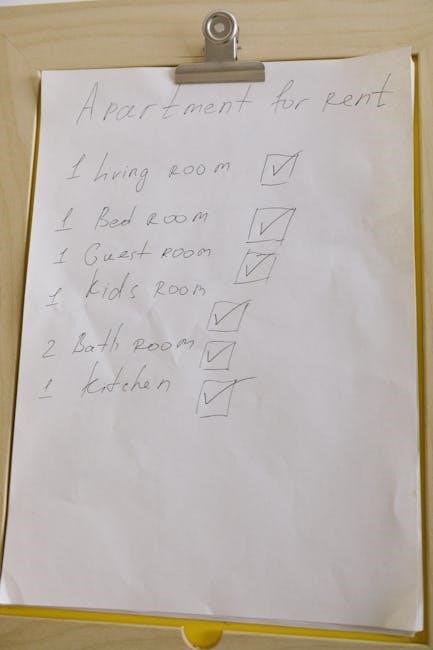
A Massachusetts Rental Lease Agreement PDF is a legally binding contract outlining rent, terms, and property use between landlords and tenants, available as a fillable, printable document.
What is a Massachusetts Lease Agreement?
A Massachusetts Lease Agreement is a legally binding contract between a landlord and tenant, outlining the terms for renting residential or commercial property. It specifies rent, payment terms, property use, and tenant responsibilities. The agreement can be for a fixed term or month-to-month and is customizable to include rules and restrictions. It ensures clarity and protection for both parties, covering key aspects like duration, maintenance, and termination. Available as a PDF, it simplifies the rental process with fillable and printable forms.

Types of Lease Agreements in Massachusetts
Massachusetts lease agreements are categorized into residential and commercial types, each tailored to specific rental needs. Residential leases cover apartments, houses, and condos, while commercial leases apply to business spaces. A standard one-year residential lease is common, but month-to-month agreements offer flexibility. Both types outline rent, duration, and property use. They can be customized to include rules and restrictions, ensuring clarity for landlords and tenants. These agreements are available as PDF templates, making them easy to fill out and print for legal validity.
Fixed-Term vs. Month-to-Month Leases
A fixed-term lease in Massachusetts typically lasts for one year, providing stability for both landlords and tenants. It outlines the duration and rent, requiring a written agreement for renewal. Month-to-month leases offer flexibility, allowing either party to terminate with notice. Rent can be adjusted monthly under this arrangement. Fixed-term leases end on a specific date, while month-to-month agreements continue indefinitely until terminated. Both types are commonly used, catering to different rental needs and preferences.

Key Components of a Massachusetts Lease Agreement
A Massachusetts lease agreement includes essential details such as rent, payment terms, security deposits, property use restrictions, lease duration, termination clauses, and maintenance responsibilities for both parties.
Parties Involved
A Massachusetts lease agreement identifies the landlord (lessor) and tenant (lessee) involved in the rental contract. The landlord is the property owner, while the tenant is the renter. Both parties must be clearly named, with their addresses and contact information included. This section ensures accountability and clarity regarding who is responsible for the property and its terms. Agents, if representing either party, may also be listed to formalize their role in the agreement. This clarity is essential for legal and communication purposes.
Rent and Payment Terms
The lease specifies the rent amount, due date (typically the first of the month), and accepted payment methods. It outlines late fees and any grace period for overdue payments. The agreement may also detail penalties for bounced checks or failed payments. Both parties must agree to these terms, ensuring clarity on financial obligations. This section is crucial for maintaining a smooth landlord-tenant relationship and avoiding disputes over rent payments. All terms must comply with Massachusetts state laws.
Security Deposits
A Massachusetts lease agreement often includes terms for a security deposit, typically limited to one month’s rent. The deposit is held to cover potential damages or unpaid rent. The agreement specifies how the deposit will be managed, such as being held in an escrow account. Upon lease termination, the deposit must be returned within 30 days, minus any deductions for damages or unpaid rent. This section ensures both parties understand their obligations regarding the deposit. Massachusetts law governs these terms to protect both landlords and tenants.
Property Use and Restrictions
The Massachusetts lease agreement outlines property use and restrictions, ensuring the rental is used as agreed, typically for residential purposes only. Tenants are often prohibited from subletting without permission or engaging in illegal activities. Landlords may specify rules about pets, guests, or modifications to the property. Violations of these terms can lead to lease termination. This section clarifies expectations for both parties, ensuring the property is used responsibly and in compliance with local laws and the lease terms. Proper adherence is essential to maintain a lawful tenancy.
Duration of the Lease
The Massachusetts lease agreement specifies the duration of the lease, which can be a fixed term or a month-to-month arrangement. Fixed-term leases outline a start and end date, while month-to-month leases renew automatically until terminated. The agreement may also include terms for lease renewal or extension. If the lease expires and no new agreement is made, the tenancy may automatically convert to a month-to-month arrangement. Clarity on lease duration is essential to avoid disputes and ensure both parties understand their obligations. Proper documentation is required for any changes;
Termination Clauses
Termination clauses in a Massachusetts lease agreement outline the conditions under which either party can end the tenancy. For fixed-term leases, termination occurs naturally at the end of the term unless renewed. Month-to-month leases require written notice, typically 30 days, from either party to terminate. The agreement may also specify grounds for early termination, such as non-payment of rent or violation of terms. Proper notice and compliance with state laws are essential to avoid legal disputes. Clear termination terms protect both landlords and tenants.
Maintenance and Repairs
A Massachusetts lease agreement typically outlines the responsibilities for maintenance and repairs. Landlords are generally required to ensure the property remains habitable, addressing structural issues, plumbing, and electrical systems. Tenants are often responsible for minor repairs and maintaining cleanliness. The lease may specify procedures for requesting repairs and handling emergencies. Clear maintenance clauses help prevent disputes by defining roles and ensuring the property is kept in good condition throughout the tenancy. Proper upkeep benefits both parties.
Subletting and Assignment
A Massachusetts lease agreement often includes clauses governing subletting and assignment. Tenants typically need the landlord’s written consent to sublet the property or assign the lease. Even with approval, the original tenant remains liable for rent and lease terms. Landlords may have specific criteria for approving subtenants, ensuring they meet similar qualifications as the original tenant. This section protects both parties by maintaining accountability and ensuring the property is occupied responsibly.
Legal Requirements and Disclosures
Massachusetts lease agreements must include mandatory disclosures, such as lead paint notifications and security deposit rules, while prohibiting illegal clauses that violate tenant rights or state laws.
Mandatory Disclosures in Massachusetts
Massachusetts requires landlords to include specific disclosures in lease agreements, such as lead paint notifications for properties built before 1978 and details about security deposit rules. Additionally, landlords must disclose any known environmental hazards, such as mold or asbestos, and provide information about the condition of the property. These disclosures ensure transparency and protect tenants from potential risks. Failure to include mandatory disclosures can result in legal consequences for landlords, emphasizing the importance of compliance with state regulations.
Prohibited Clauses in Lease Agreements
Massachusetts law prohibits certain clauses in lease agreements to protect tenant rights. These include clauses that waive liability for landlord negligence, restrict tenants from seeking legal remedies, or impose unreasonable penalties. Additionally, landlords cannot include provisions that violate state or federal laws, such as discriminatory practices or unauthorized rent increases. Tenants should be aware of these prohibited clauses, as their inclusion renders the lease unenforceable. Always review the agreement carefully to ensure compliance with Massachusetts regulations.

Creating a Massachusetts Lease Agreement
Creating a Massachusetts lease agreement involves using standardized templates or online tools to ensure compliance with state laws and include all necessary clauses for a valid contract.
Using Templates and Forms
Using templates and forms is an efficient way to create a Massachusetts lease agreement. The Greater Boston Real Estate Board offers standardized templates that are fillable and printable as PDF or Word documents. These templates ensure compliance with state laws and cover essential clauses. They are designed to save time and reduce errors, providing a clear structure for both landlords and tenants. Customization is possible to meet specific needs while maintaining legal compliance.
Online Tools for Generating Lease Agreements
Online tools simplify creating Massachusetts lease agreements by offering customizable templates and step-by-step guidance. Platforms like LawDepot and legal websites provide downloadable PDF forms that comply with state laws. These tools allow landlords and tenants to input specific details, ensuring accuracy and efficiency. They often include features for electronic signatures, making the process convenient and streamlined. Using these resources helps avoid legal pitfalls and ensures all necessary clauses are included, saving time and effort.
Benefits of a Written Lease Agreement
A written lease agreement provides clarity on terms, protects both landlords and tenants legally, and prevents disputes by outlining responsibilities and expectations clearly.
Protection for Landlords
A written lease agreement safeguards landlords by ensuring rent is paid on time and outlining tenant responsibilities. It covers property use, prohibited activities, and violation consequences, providing a legal framework for resolving disputes and maintaining property integrity. Landlords are protected from unauthorized changes or damages, with clear terms for termination if agreements are breached. This document ensures landlords’ rights are upheld, offering legal recourse if tenants fail to meet obligations, thus protecting their investment and financial interests effectively.
Protection for Tenants
A Massachusetts Rental Lease Agreement PDF protects tenants by ensuring landlords meet legal obligations, such as maintaining habitable living conditions and returning security deposits. It outlines tenant rights, including protections against unlawful evictions and sudden rent increases. The agreement also clarifies responsibilities, preventing landlords from making unilateral changes to terms. This document provides tenants with legal recourse if their rights are violated, ensuring fairness and transparency throughout the rental relationship.

Common Mistakes to Avoid
Common errors include omitting key clauses, unclear payment terms, and improper tenant screening. Ensure all terms are detailed to prevent disputes and legal issues later.
Errors in Lease Agreement Preparation
Common mistakes in preparing a Massachusetts lease agreement include omitting key clauses, such as security deposit terms or termination procedures. Landlords may also fail to clearly outline rent payment details, leading to disputes. Additionally, improper tenant screening processes and unclear property use restrictions can result in legal issues. It’s essential to ensure all terms are accurately detailed and compliant with state laws to avoid potential conflicts and legal consequences for both parties involved.
Omissions in Key Clauses
Omissions in a Massachusetts lease agreement can lead to legal disputes and misunderstandings. Commonly missed clauses include security deposit terms, termination procedures, and property use restrictions. Failing to specify rent payment details or maintenance responsibilities can also cause conflicts. Omitting mandatory disclosures, such as lead paint notifications, violates state laws. Ensuring all essential clauses are included prevents disputes and ensures clarity for both landlords and tenants, maintaining a smooth rental relationship.

Role of the Greater Boston Real Estate Board
The Greater Boston Real Estate Board offers standardized, fillable lease templates and resources, aiding landlords and tenants in creating compliant agreements and ensuring smooth rental processes in Massachusetts.
Standardized Lease Forms

The Greater Boston Real Estate Board provides standardized lease forms, ensuring compliance with Massachusetts laws. These fillable, printable templates are available as PDFs or Word documents, covering residential and commercial agreements. They include essential clauses on rent, term, and property use, reducing legal risks. Regularly updated, these forms reflect current legal requirements, offering a reliable framework for landlords and tenants to create enforceable agreements efficiently.
Resources for Landlords and Tenants
The Greater Boston Real Estate Board offers comprehensive resources, including standardized lease forms and guides, to assist landlords and tenants in Massachusetts. Official templates for rental agreements are available as downloadable PDFs or Word documents, ensuring legal compliance. These resources provide clarity on lease terms, rights, and responsibilities, helping to avoid disputes. They also include updates on Massachusetts rental laws, making it easier for both parties to create fair and enforceable agreements.

Filling Out the Massachusetts Lease Agreement PDF
The Massachusetts Lease Agreement PDF is a fillable document requiring details like tenant and landlord info, rent terms, lease duration, and signatures for legal validity.

Step-by-Step Guide
Download the Massachusetts Lease Agreement PDF from a trusted source, such as the Greater Boston Real Estate Board or legal websites.
Fill in the landlord and tenant details, including names, addresses, and contact information.
Specify the property address, lease term, and rent amount with due dates.
Outline the security deposit details and any property use restrictions;
Include clauses for termination, maintenance, and subletting policies.
Review and ensure all fields are completed accurately.
Print the document and have both parties sign it for legal validity.
Important Fields to Complete
Essential fields in a Massachusetts Lease Agreement include the names and addresses of both the landlord and tenant, property details, rent amount, and payment terms.
The lease term, whether fixed or month-to-month, must be specified, along with the security deposit amount and conditions for its return.
Clauses regarding property use, maintenance responsibilities, and termination procedures are also critical.
All parties must sign and date the document to ensure its validity under Massachusetts law.
Reviewing and Signing the Lease
Tenants and landlords must carefully review the lease agreement, ensuring all terms are understood and agreed upon before signing. Both parties should ask questions and seek clarity on any unclear clauses to avoid future disputes. Once satisfied, signatures are required to finalize the agreement, making it legally binding under Massachusetts law.
Tenant’s Guide to Lease Review
Tenants should thoroughly review the Massachusetts lease agreement to understand their rights and responsibilities. Carefully check clauses regarding rent, security deposits, and property use. Ensure all terms align with agreed-upon conditions and seek legal advice if unclear or unfair clauses are present. Comparing the document with a standard form from the Greater Boston Real Estate Board can help identify discrepancies. Understanding the lease fully before signing is crucial to avoid future disputes and ensure a smooth tenancy experience.
Understanding the Terms Before Signing
Before signing a Massachusetts lease agreement, tenants must carefully review and understand all terms. This includes rent amount, payment due dates, lease duration, and termination clauses. Security deposit conditions, property use restrictions, and maintenance responsibilities should also be clear. Tenants should ensure they understand their legal obligations and rights under the agreement. If any terms are unclear or seem unfair, seeking legal advice is recommended to avoid future disputes or financial penalties. Clarity ensures a mutually beneficial tenancy experience.
Violations and Disputes
Violations of a Massachusetts lease agreement can lead to legal consequences, including eviction or financial penalties. Disputes often arise from non-payment of rent or property damage, requiring mediation or court resolution to address both landlord and tenant responsibilities fairly.
Consequences of Lease Violations
Violating a Massachusetts lease agreement can result in eviction, financial penalties, or legal action. Tenants may face eviction for non-payment of rent or property damage, while landlords can be held liable for unlawful actions. Legal consequences often involve court proceedings, where either party may seek damages or enforcement of lease terms.
Understanding the potential consequences of lease violations is crucial for both landlords and tenants to maintain a lawful rental relationship and avoid costly disputes.
Resolving Disputes Between Landlords and Tenants
Disputes between landlords and tenants in Massachusetts can often be resolved through mediation, arbitration, or legal action. The Greater Boston Real Estate Board provides resources to help resolve conflicts amicably. Tenants and landlords can also seek assistance from housing courts or local tenant organizations. Legal action may be necessary if violations of the lease agreement occur, ensuring both parties adhere to their contractual obligations and state laws.
Documentation and clear communication are key to preventing and resolving disputes effectively.

Amending or Renewing the Lease
A Massachusetts lease can be amended or renewed through mutual agreement between landlord and tenant, often requiring a written addendum or new contract outlining updated terms.
How to Modify the Lease Agreement
To modify a Massachusetts lease agreement, both landlord and tenant must agree in writing. An addendum detailing the changes should be signed by both parties. This ensures the lease remains legally binding and reflects any updates to terms, such as rent adjustments or property use. Changes cannot be made unilaterally; mutual consent is required to maintain the contract’s validity. Proper documentation is essential to avoid disputes and ensure clarity for all parties involved.
Renewal Process and Terms
The renewal process for a Massachusetts lease agreement requires mutual agreement between landlord and tenant. If both parties wish to extend the lease, a written renewal agreement must be signed. Terms, including rent and duration, should be clearly outlined. If no formal extension is agreed upon but the landlord accepts rent beyond the original term, the tenancy automatically converts to a month-to-month arrangement. Proper documentation ensures clarity and legal compliance for both parties.
Frequently Asked Questions
Common questions about Massachusetts lease agreements include queries about terms, rent payments, security deposits, and where to find official PDF templates for legal compliance and ease of use.
Common Queries About Massachusetts Lease Agreements
Common questions often revolve around lease duration, rent payment terms, and security deposits. Tenants and landlords also inquire about prohibited clauses and required disclosures. Many seek clarification on the difference between fixed-term and month-to-month agreements. Additionally, there are frequent questions about where to find official templates and how to ensure legal compliance. Understanding tenant and landlord rights, as well as the process for resolving disputes, are also popular topics. These queries highlight the importance of a well-drafted lease agreement.
Clarifications on Lease-Related Issues
Clarifications often address misunderstandings about lease terms, tenant responsibilities, and landlord obligations. Common issues include interpreting rent payment schedules, security deposit returns, and termination clauses. Tenants may seek clarity on property use restrictions, while landlords may question their legal rights. Dispute resolution processes and eviction procedures are also frequent topics. These clarifications ensure both parties understand their roles and responsibilities, fostering a smoother rental experience and reducing potential conflicts.
A Massachusetts Rental Lease Agreement PDF provides a clear, legally binding framework for rental relationships. It ensures both landlords and tenants understand their rights and responsibilities, fostering mutual respect and compliance. By outlining terms, payment details, and property use, it minimizes disputes and offers protection under Massachusetts law. Utilizing standardized templates simplifies the process, ensuring all parties are informed and agree to the terms, promoting a smooth and lawful rental experience for everyone involved.




